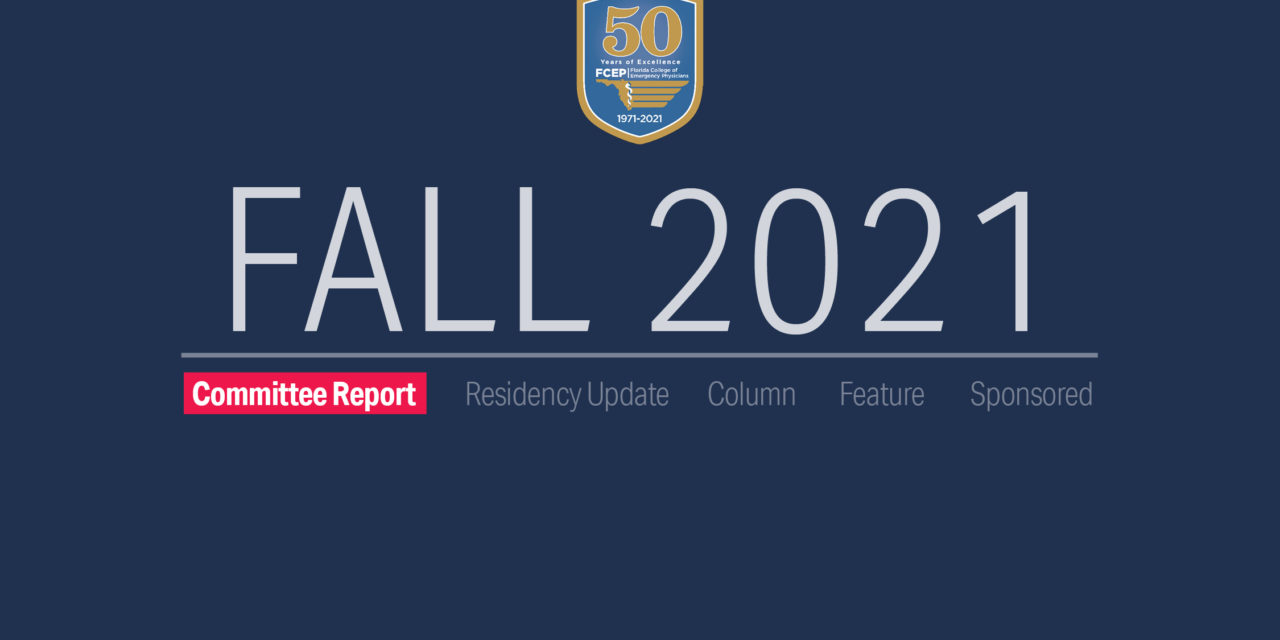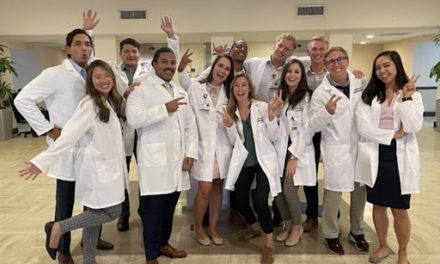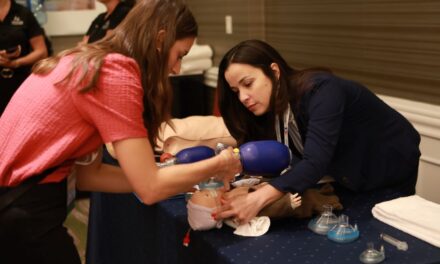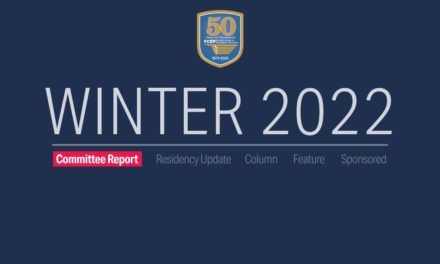FCEP President’s Message: Fall 2021
My fellow FCEP members,
I’d like to begin my first letter to you by humbly thanking you for allowing me to represent one of the most talented group of physicians that our healthcare systems are fortunate to have: emergency physicians. It is an honor and a privilege to lead FCEP, one of the strongest and most versatile ACEP state chapters in the nation!
I’d also like to thank those of you who could join us at Symposium by the Sea 2021, our first in-person meeting in nearly two years. As we met in Naples and were joined virtually by our colleagues—many of whom, like the rest of us, have been so busy dealing with the latest surge—I am mindful of the service, sacrifice and relevance of all FCEP members to our specialty and patients. I know everyone enjoyed reconnecting with each other after our two-year hiatus, telling stories, laughing, smiling and remembering “the good old days.”
This dedication and spirit drives me as I begin my service as your president, especially as we celebrate 50 years as an organization.
You know, it’s easy to advocate for emergency physicians. We know what’s up. We treat all people 24/7/365, regardless of race, religion, sexual orientation, gender identity, nationality, socioeconomic class or the ability to pay. We are passionate about our specialty and our patients. We are comfortable with being uncomfortable. We push the limits. We shelter our team members, lead in the darkest of times, and give the homeless guy his sandwich. We are EM physicians. In my mind, we are the best of the best, intellectually, emotionally and spiritually.
My goals as we continue our journey over the next 50 years together address several issues that are top of mind for all of us, and they center on common issues of advocacy, workforce stability, fair payment and mental health. Executing and achieving them is going to be a challenge for all of us. In so doing, we will bring forth the leadership our members expect in government and public affairs, along with delivering the relevant training and education they want and need to pursue professional growth, achieve practice management success and deliver better patient outcomes.
Let’s talk about the first area of our continued focus: FCEP will continue to be the most effective advocate for the specialty, while also collaborating with other healthcare associations and leading the House of Medicine whenever needed, on the best possible course. It seems like some issues never stop revolving around the capitol, including the ongoing deliberation over personal injury protection (PIP) law revisions due to the controversy over eliminating the “no fault” provisions and the impact (unknown or negative) to insurance rates. Our 85% solution through amendments to the bill was a solid win. With the veto, we have a no change and a 100% solution, for now.
Also signed into law was the correction to the prior session’s glitches with the pelvic exam consent law. This was a good example of coalition forming with the FMA, and FCEP leading the discussion to amend previous legislation with unintended consequences.
The bill regarding parental consent for medical treatment of minors, now signed into law, provides another good example of collaboration. FCEP joined other specialties and the FMA in a veto request, and FCEP successfully placed the needed amendment into the Senate version before this law was passed. As you are familiar with the bill, it allows EM or other physicians who provide lifesaving care to minors be punished with a misdemeanor when treating those minors outside of a licensed healthcare facility without parental consent. So we can do what we do in the ER, but outside of the ER, we are faced with a misdemeanor when we jump into action without a parent around? This poses significant moral and ethical dilemmas for us. We will work with other specialties and the FMA toward a correction early in the 2022 legislative session.
Many people ask me, what does advocacy accomplish? Why do we give money to legislators and senators, like Sen. Kathy Passadimo? You are not an N of 1: FCEP builds relationships, understanding and influence so that if we are unsuccessful in enacting or killing bills, we can at least amend them to benefit our patients.
A second large and ongoing chapter discussion pivots around emergency physician workforce and stability. On April 9, 2021, ACEP and national partner organizations presented findings from their work on the “Emergency Medicine Physician Workforce: Projections for 2030.” Data reveals that, for the first time in history, we are facing a projected oversupply of 6,000-10,000 emergency physicians nationwide over the next decade if we do nothing to mitigate current trends now. FCEP’s next step is to translate the data from ACEP’s eight key considerations to address workforce stability into action plans that will stabilize and strengthen the field of emergency medicine.
ACEP acknowledges and FCEP realizes that “there is not one perfect, holistic solution to address market-driven industry instability. Shifting healthcare economics and evolving practice models affect each of you in different ways.” Whether you work for a small private group, academic center or large corporate medical group (CMG), perhaps we can all agree that maybe our collective message needs to be changed. The dialogue with ARNP and scope of practice has been tilted towards access to care. If we do indeed have a surplus, let’s leverage this and fill the perceived gaps ourselves. We need to better organize ourselves and help shape the narrative. Yes, the number of residencies popping up across the state over the past few years can raise anyone’s eyebrow. But my goal as your president will be to help connect each and every one of these young physicians to the intellectual potpourri this College can lend them. Let’s stay organized with one message, marching to one drumbeat.
Third, FCEP leaders will continue to fight in the ongoing battles for fair payment. With legacy mandates of EMTALA and prudent layperson standards, we find ourselves in another cycle of third-party “cost shifting.” With companies like United Healthcare threatening to implement automatic downcoding and/or denials on emergency medicine bills—and doing so in a retrospective way that removes bedside physician gestalt —we must remain vigilant. This is ironically the result of what we have advocated against in years past: balance billing the patient. Our work in this area will always be difficult as we strive to find solutions that will impact both patients and physicians fairly, as FCEP’s advocacy uniquely places our patients’ needs first.
With so many goals for next year, I’d like to comment on one more today: the need for the chapter to provide emergency physicians with the necessary resources to cope with the daily increase in challenges that face us on the front lines. Maintaining our mental health is vital to our longevity in our professional career. We are experiencing stress from every angle, and many may feel like the pandemic is sucking the life out of us.
What separates and yet unites us is our common, essential traits that get us through every shift: our resilience, our compassion and our intellectual versatility. We move on from the pediatric code to the end-of-life withhold of care on the 82 DNR. We make things happen under the least favorable of circumstances. We give ourselves every day to our patients, to our staff and to families. We are the anchors that stabilize the healthcare model drift. Yet, we are vulnerable. And we need to embrace this vulnerability: acknowledge our own, and recognize each other’s. We can do a better job providing for those that are in need of help. This is a powerful topic, and one that not many of us are good at discussing.
I deliberately did not address the pandemic in great detail since we all live it every shift. But with every challenge we face —whether it is overcrowding/boarding of Covid patients in the ED, nursing staff shortages, or lack of PPE —when things are at their worst, we get better and change the situation around us. When the hour is darkest and trials are their greatest, you elevate yourself to another level and create solutions, because that is what emergency physicians do.
FCEP has a promising future. We will continue chapter growth, with subsequent increase in leadership potential and intellectual capital. Together we will continue to maintain vigilance, fiscal responsibility, and advocate for our patients. Today, I would like to make you a promise: to humbly serve you. I will always keep an open mind, lead with objectivity, be nonpartisan and represent all of you; not myself.
Although I may be the lead speaker in certain forums and venues, our FCEP tribe has a collective soul, a collective voice, and a collective mind. We are all leaders, each with passion, and each with something to offer at the table. I will look to you over the next year for your counsel and your knowledge, but most importantly, your friendship and your trust.
May you have enough happiness to make you sweet, enough trials to make you strong, enough sorrow to keep you human, and enough hope to make you happy. My recently deceased father once said to me: “Your brightest future will always be based on a forgotten past; you can’t go forward in life until you let go of your past failures and heartaches. Embrace them, and embrace each other.”
I am so proud to be your president. God bless you, and thank you for being you. ■
This article is part of the following sections:





